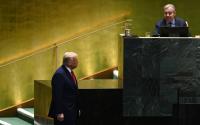20 December 2005Tom Dispatch
The United States has always been the land of second chances and proud of it. So, in the true American second-chance spirit, Tomdispatch has given Rebecca Solnit, our favorite optimist, two shots at nailing this year to the wall -- and both have turned out splendidly. (That's not surprising, since 2005 generated enough material for twenty end-of-the-year pieces with something left over.) The early-bird version of her take on 2005, Three from Out of the Blue, focused on the surprise appearances of Cindy Sheehan, hurricane Katrina, and that back-from-extinction award-winner of the century, the Ivory-billed Woodpecker. Now, from a perch in distant Tierra del Fuego, she offers us 2005 as a David-and-Goliath struggle.
In the meantime, her Tomdispatch-generated book, Hope in the Dark: Untold Histories, Wild Possibilities, is within days of being reissued (but can be preordered) in an updated edition from Nation Books. She and I first "met" at the site when she sent in a piece, Acts of Hope, that later was transformed into Hope in the Dark. Now, the book -- a paean to the unexpected, to the wonders of what we don't know is coming -- has been fortified by material from her recent Tomdispatches, whole new chapters considering hope (and despair) in the context of the reelection of George Bush and the emergence of figures like Sheehan. Think of this as the upgraded or 2.0 version of the original -- and as a must-have for the new year.
What a surprising year 2005 turned out to be! Don't expect less of 2006. So read Solnit, buckle your seatbelt, and prepare yourself for a wild ride. Tom
2005: Bad Year for Goliath
How About David?By Rebecca SolnitTo say that it was a bad year for Goliath doesn't mean it was exactly a good one for what George Bailey, in annual holiday It's a Wonderful Life reruns, calls "the little people." U.S. public opinion has almost caught up with the rest of the world in opposing the war, but Iraqis are still being bombed and American soldiers are still dying.
I write this from Buenos Aires, which attracts activists from afar for its progressive social movements, but up close is more compelling for its armies of the poor -- such as the cartoñeros who come out after dark to collect recyclables, families pushing huge loads through the summer night toward whatever pittance a pile of old cardboard brings in. In the same way, you could focus on how Hurricane Katrina damaged the Bush administration's standing, but the suffering of people displaced on roofs, and then in sports stadiums, and now out of view (but in hardly less precarious circumstances around the country) might matter more.
The most compelling images of 2005 are those of war, flood, and riot, but perhaps the most summary one wasn't even of human beings. It was a novelty photograph that appeared in many newspapers in late September of a huge non-native python that choked itself to death trying to swallow an alligator in Florida. It proved a lasting image of overwhelming and unsuccessful greed. All around the world this year, the snake choked and the alligator refused to see itself as lunch -- if you will let "alligator" stand in here for "civil society," for all the groups, organizations, publics, and citizenries who stood up for their rights.
Nobody did this better in 2005 than the extraordinary Coalition of Immokalee Workers, which in March brought one of the biggest prepared food corporations on Earth, Taco Bell's owner, Yum Brands Incorporated, to its knees. Or, you could say, choked it on its own fajitas and forced it to swallow a compellingly better set of working standards for those who pick the tomatoes that get diced up and sprinkled by the kids in starchy blouses atop your -- if you weren't part of the enormously successful Boycott the Bell campaign -- tostada. The largely immigrant workforce, based in the bleak Florida town of Immokalee, had been organizing for more than a decade, and their campaign to raise the price for picking tomatoes by a penny a pound (a measly sum that nevertheless nearly doubled many workers' salaries) was inspired. Creative in specific tactics like theatrical performances and marches as well as in coalition-building with college students, religious groups, and others, the CIW made undocumented farmworkers powerful again -- and they are taking on McDonald's next.
Speaking of food, just what kind of corn is in your tortilla anyway? A few years ago, microbiologist Ignacio Chapela, then an assistant professor at the University of California, Berkeley, wrote a report demonstrating that bioengineered corn, though banned from being planted in Mexico, was nevertheless springing to Frankensteinian life there, contaminating that country's corn crops. The preeminent science journal Nature published it with an unprecedented caveat, though the real cause for concern wasn't Chapela's credentials or methodology but the threat his work as a scientist and critic -- of, among other things, Novartis' funding of his department -- posed to multinational corporations. (A subsequent independent study validated his results.) Chapela was then denied tenure at Berkeley by a committee that appeared to have major conflicts of interest. After a two-year campaign that included demonstrations, teach-ins, and other forms of ruckus, a higher tenure review committee overturned the decision of the highly politicized departmental committee that had rejected him. It was a small victory, but an emblematic one in this year of crumpling Goliaths.
Back in Mexico, Vicente Fox's party, the PAN, attempted to disqualify Mexico City's Mayor Manuel Lopez Obrador from next year's presidential election over a tiny legal technicality. It was a move as bald-facedly overblown in its grounds and biased in its agenda as the impeachment hearings against Bill Clinton (which, this year, had the handy, if belated, effect of making it harder for Republicans to object to special counsels pursuing perjury charges). About a million people marched in Mexico City to condemn this blatantly corrupt move, a popular opposition that the PAN found, ultimately, irresistible. The charges were withdrawn and Obrador is now favored to win next spring; he will likely become a comparatively uncorrupt and progressive president for a country that has long deserved far more.
The great conundrum of recounting recent history is this: Individual names have to stand in for movements that generally remain not just nameless but often overlooked; the antiwar movement in this country, for instance, became "Cindy" for bereaved mother and outspoken activist Cindy Sheehan. That focus obscured out-of-the-limelight achievements in counter-military recruitment, in defending and supporting conscientious objectors, and in other forms of resistance that preceded her heroic stand, and even Sheehan's innovative power was due in large part to the thousands who marched with her, camped with her, held vigils with her, got arrested with her, and supported a movement that is, by its definition, plural. You could say that, again and again, we mistake the hood ornament for the engine that moves us forward -- or backward, since pro-war neoconservatism gets called "Bush" as often as the peace movement is dubbed "Cindy."
2005: Election Surprises
There were some interesting elections this year. Los Angeles voted in that city's first Latino mayor since the nineteenth century, the progressive Antonio Villaraigosa, after years of dour businessmen; and San Diego nearly elected Donna Frye, the surfer-environmentalist who had already won the mayor's race the year before as a write-in candidate but had been disqualified on a technicality akin to hanging chads. (Thousands of those who wrote her name in didn't also check the right box, though their intent was perfectly clear.)
Crossing the border again and heading south: In Chile, on December 11, voters brought a socialist feminist, Michelle Bachelet, very close to the presidency. (The run-off is next month and, though her election is expected, the country may yet swing right rather than left.) In Bolivia, the stew was even thicker as indigenous leader Evo Morales, head of the Coca Growers Union and a far-left activist, actually took the presidency this week. Bolivia has been an extraordinary country over the past few years, with an insurgent, mostly indigenous peasantry that has ousted a couple of presidents and determined the course of national policy, including successful fights against the privatization of resources such as natural gas and water. Morales represents not just another leftist in power in Latin America, but perhaps the first indigenous person to assume such a position, at least a symbolic end to what has been nearly half a millennium of colonialism in Bolivia.
Morales, however, may be the next Salvador Allende -- his election signifies so divergent a vision for the Americas that U.S. citizens should be prepared to contain their government's potential reactions. (The situation is likely to bring up fears of the ugly years of the 1980s when, in the name of anticommunism, the Reagan Administration attacked the Sandinistas in Nicaragua and supported state terror in El Salvador and Guatemala.) Venezuelan president Hugo Chavez has made a sport of thumbing his nose at George Bush, and though he is a demagogue more than a true populist, he owes his current reign and perhaps his life to the people in the streets who reversed the coup in Caracas in 2002 -- which the Bush administration loved and aided.
Elections in both South and North America have been less interesting for the individuals who got elected than for the way they have expressed popular will. Even the best candidates seem to have fallen far short of the ideals of the electorate. People here reach far beyond where their so-called leaders ever arrive. They seem to be heading toward something that perhaps leaders as such cannot address. There is an incipient sense in movements around the world that democracy needs not only to be redefined but redeployed in some as yet unimaginable form; that another world is possible, but we are still figuring out what it could possibly look like. Of course, decent elected leaders aren't the biggest issue now; indecent ones, elected or not, are.
2005: Goliath Totters
And speaking of Bush, it was a pretty good year for people who stated all the most inconvenient facts or (as they liked to call it way back when) spoke truth to power. Even the powerful piped up surprisingly loudly sometimes -- from Congressman John Murtha who decried the whole damn war and highlighted the American wounded (so often forgotten) to Senator John McCain who took a heartfelt stand against torture -- even if the moment had come for ambitious Republicans to regard Bush as something akin to an Ebola-infected chimp. And a bad year for those who would only state the facts convenient to the powerful: the downfall of Judith Miller and the humiliation of Bob Woodward tainted the country's two leading newspapers, which had tolerated their "access journalism" (think: sycophancy) in ways that damaged both the media and democracy. Those plummeting stars grudgingly, belatedly fingered some of the Bush administration's key players on the way down. (As a much better journalist, Robert Scheer, pointed out, had Miller spoken up sooner, the outcome of the presidential election might have been different. Thank you Judy, and a more sincere thank you to the San Francisco Chronicle, which quickly hired Scheer when the Los Angeles Times, whose Chicago owners have been yanking its chain hard lately, fired him.)
Plamegate, speaking of snakes, began as yet another attempt by top Bush administration officials to punish those who dared to contradict them. Valerie Plame and husband Joe Wilson may yet have the satisfaction of seeing the meltdown of the regime that attempted to squash them. The course of the next three years is unimaginable but will hardly be uninteresting. This year alone saw the United States turn a few degrees at a time like some ungainly aircraft carrier, by slow stages from obeisance to the administration to scorn via the rejection of the assault on Social Security, the antiwar movement, the last several scandals around the war, the abysmal failure of Bush as well as his FEMA and Homeland Security pals in the face of Hurricane Katrina, and belated shifts in the House and Senate. The sound of Republicans caving in became a sort of autumn symphony for many of us.
When Murtha spoke out, novice Republican Congresswoman Jean Schmidt attacked him as a coward and had to eat her words, not long before the Republicans in the House even more quietly killed a stunning bit of legislation by Congressman Richard Pombo that would, essentially, have given away most of our public lands to mining companies and other private interests. Then, just last week, the usually anti-environmental (and mostly Republican) Utah congressional delegation got a huge area declared "wilderness" to block a train that would, sooner or later, have brought nuclear waste into the state for storage. Lately, there have been moments when the legislative branch of the federal government acted like a body independent of the executive branch, though being grateful for that is like being grateful your husband doesn't currently beat you.
In 2005, there was a growing sense across the political spectrum that the existing array of possibilities and positions had been used up, that the ocean liner had run aground. Who knows what comes next?
2005: David Flexes His Muscles
As the mainstream news media faltered -- newspaper and TV news audiences were on the decline all year -- news from alternative sources mattered more than ever, and so did alternatives to the federal government. For a long time, individual cities, counties, and states have attempted to pass legislation far more progressive than that handed down by the federales (and sometimes even succeeded in doing so). This was a good year for localities. In the most high-profile event, the U.S. Conference of Mayors produced a declaration aligning itself with the Kyoto climate change protocols, signed by nearly two hundred mayors from Seattle, Chicago, and San Francisco to small towns across the country. Like the auto-emissions standards California and several New England states are implementing, this kind of action constitutes an end run around federal policy, or lack thereof, on climate change. Thousands of cities and towns have dissented on other issues -- from the war and the administration's torture policies to the USA Patriot Act -- adding up to an unofficial America that is a bright contrast to the forces in Washington. Once again the people look better than their supposed representation.
Not that state governments are all good. In the things-money-can't-buy department is the California electorate. In a stunning upset in November, we rejected all eight initiatives on the ballot of an expensive and wholly gratuitous special election called by our own Goliath incarnate, Arnold Schwarzenegger. Four of them were his own initiatives, bankrolled with seven million or so dollars from his own pocket. (The initiative system was meant to lead to citizen-led direct democracy, not authorities pushing policies without going through all the tedium of getting legislative approval.) Schwarzenegger's quartet included measures to prevent unions from participating in the political process and to beat up on nurses and teachers, two professions he singled out for verbal abuse and political attacks for at least a year before the election. At one point he said of the nurse's union, "The special interests don't like me in Sacramento because I am always kicking their butts." Nurses never were a special interest, at least for those of us who are born, die, and in-between times might get sick. Nobody is kicking their underpaid undersides now. And the Terminator probably won't be back.
It was a crummy year for those used to planning the global economy too. Three conferences went astray -- first the G8 in Scotland, which became a referendum on the role the richest nations (and the corporations whose interests they represent) play in creating mass poverty; then the Free Trade Agreement of the Americans (FTAA) in Argentina, which became an anti-Bush fiesta and led to no new agreements; and finally the World Trade Organization (WTO) in Hong Kong a few days ago, for which opposition began building in November, with massive demonstrations in the very politically lively country of South Korea. This weekend, as Evo Morales was being elected in Bolivia, massive demonstrations in the streets of Hong Kong sequestered the WTO delegates in their meeting halls, where they were rumored to be living on candy bars and in fear. The WTO looks to be stumbling again, though as I write it remains to be seen whether the wealthy nations will succeed at last in forcing the poorer ones to submit to a global financial scheme favoring the former. The street protests focused on the murderous future the WTO would like to plan for the poor.
The poor were also a major focus of the debates around Hurricane Katrina and the abandonment of New Orleans, though there were large-scale environmental issues at stake as well -- notably the clear-cut arrival of climate change for those who were waiting to be beaten over the head with the facts. Here again, Goliath was hit hard, but David hardly triumphed. The highly unnatural disaster of the Bush administration's callousness, incompetence, and sheer, raging cluelessness was a turning point for national public opinion. It was a little alarming to find out how many people were shocked, here and abroad, by the dire poverty the hurricane exposed. (In that way, it brought to mind the response to the Rodney King beating in 1992, which was shocking only to those unfamiliar with race politics in the inner city.)
On the other hand, the heartfelt response -- the more than two hundred thousand beds offered by strangers to strangers on Moveon.org's temporary website hurricanehousing.org, the volunteers who arrived on the scene with everything from helicopters and power boats to soup kitchens -- once again highlighted how much better unofficial America was capable of acting than its official representation. Nevertheless, hundreds of thousands of hurricane evacuees remain displaced and, now that media attention has wavered, are largely forgotten as they attempt to put lives back together in strange places with inadequate resources facing labyrinthine bureaucracies. The young nonwhite men in the urban hinterlands of France face similar obstacles and obliviousness, and during days of rioting and arson they made the rest of the world aware of it.
There are moments when it looks like George Bush is unwittingly realizing some warped version of a radical revenge fantasy: the dismantling of American power. I sometimes wonder whether we won't look back on his reign as the moment when the world's last standing superpower started to totter. After all, 2005 was the year in which political commentators first began comparing the present state of the U.S. to the last days of the late great Soviet Union; while Bush's whimsical little war brought the American military into worldwide shame and near internal collapse, with exhausted soldiers, dismal recruitment rates, and worse morale, as the planet's most powerful army proved unable to successfully occupy a militarily minor country.
I hesitate to call the Bush administration's economic urges a policy, since the point of a policy is to steer, and they have done their part -- with a reckless combination of tax cuts, binge spending, stunning deficit-building, and waving bye-bye to jobs going overseas -- to steer the U.S. economy off a cliff (which is where I picture us headed when the President insists yet one more time that we must "stay the course"). Meanwhile, our global alliances, reputation, and treaties are in all kinds of trouble and chaos. This isn't good news, but it does offer the rest of the world an opening for some more reinvention.
Thirteen months ago, when Bush was reelected, the despondent around me seemed to think that our future was graven in stone. But in the best and worst of ways, in this wild, wild year that ends so differently than it began, it has turned out to be written in water. Much of the news is grim, but the best of it is being lived out by nurses, immigrant farmworkers, Korean farmers, campers in the grass of Crawford, Texas, marchers in the streets of Washington, Mexico City, Buenos Aires, Hong Kong, and elsewhere, scribblers on various blogs, volunteers in various crises, and the immeasurable force of people everywhere who won't let the official version go unchallenged anywhere.
Rebecca Solnit is currently in Tierra del Fuego, which also has anti-Bush and antiwar graffiti, and a lot more daylight than you do right now, gentle reader. Her Tomdispatch-generated book, Hope in the Dark: Untold Histories, Wild Possibilities, is within days of being reissued (but can be preordered) in a massively updated edition from Nation Books.






